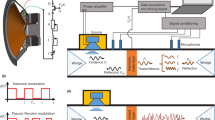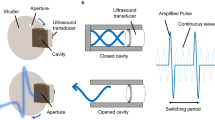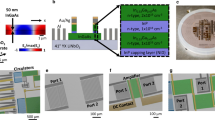Abstract
MEASUREMENTS have recently been made of the radiation impedance of sound projectors working in arrays. The projectors used each consist of a 45° Z-cut ammonium dihydrogen phosphate crystal cemented to a flint-glass piston. The projectors resonate near 18 kc./s. and have a square face of side a = 0.55 in., so that ka = 1.050 = 27πa/λ, where k is the propagation constant of the fluid load, water, and λ is the sound wave-length in water. The equivalent circuit of this simple sound projector is known so that from a measurement of the electrical admittance of any projector near resonance it is possible to deduce both the radiation resistance and reactance at the piston diaphragm. For these measurements the projectors were driven in parallel at 3 volts, and the resonant frequencies of the projectors in air differed by less than 0.2 per cent.
This is a preview of subscription content, access via your institution
Access options
Subscribe to this journal
Receive 51 print issues and online access
$199.00 per year
only $3.90 per issue
Buy this article
- Purchase on SpringerLink
- Instant access to full article PDF
Prices may be subject to local taxes which are calculated during checkout
Similar content being viewed by others
Author information
Authors and Affiliations
Rights and permissions
About this article
Cite this article
RUSBY, J. Measurements of the Total Acoustic Radiation Impedance of Rigid Pistons in an Array. Nature 186, 144–145 (1960). https://doi.org/10.1038/186144a0
Issue date:
DOI: https://doi.org/10.1038/186144a0



